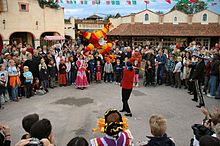Piñata
The piñatas [ piˈɲata ] are colorfully designed figures, nowadays made of paper mache , formerly made of clay pots wrapped in crepe paper, which at children's birthday parties are filled with sweets and traditionally with fruits (mandarins, sugar cane , guavas , tejocotes , jicamas , peanuts ). They are common in Mexico and Central America at children's birthdays and at Christmas time and in Spain at Easter . Piñatas have been offered on the German market by retailers since the 2010s.
regulate
Blindfolded children take turns hitting the piñata with a stick until it breaks and the surprises hidden inside fall out. The piñata usually hangs on a rope over the children and can only be reached with a stick. Another variation is to attach the piñata so that it can be pulled up and down to make it even more exciting and fun. One child at a time is blindfolded and tries to hit the piñata with the piñata stick and break it open . Meanwhile, the other children sing the song below. When the song ends, the next child can try their luck. If the piñata breaks , all children are allowed to pick up as much as they can catch. For smaller children there is the pullpiñata . These piñatas have several strings at the bottom, which the children take turns pulling; only one of the strings opens the compartment from which the toys and sweets fall out. To help the child find and meet the piñata , sing:
|
Spanish text
Dale, dale, dale |
Analogous translation
Hit them, hit them, hit them |
In addition to this version, there is the following shortened version and various other songs:
|
Spanish text
Dale, dale, dale |
Analogous translation
Hit them, hit them, hit them |
meaning
For Central America, the piñata is a symbol of fiestas .
The traditional Christian piñata is a ball with seven conical tips that symbolize the seven deadly sins . In the run-up to Christmas , these stars are often used in the celebrations of the posadas , they symbolize evil . Once smashed, the falling fruit and sweets represent the blessing for all participants. The stick that is used to strike symbolizes the strength that God gives one to fight evil, the blindfolded faith . Today the piñata has lost its religious symbolism, except at Christmas time, and is used for entertainment.
Modern piñatas are shaped like cartoon characters , treasure chests or unicorns . Some are modeled on the looks of politicians.
history
The piñata originally comes from China , where Marco Polo is said to have seen it for the first time in the form of cows . With colored paper and other decorative elements, you greeted the New Year with it. The figures were smashed with sticks and then burned , the ashes were collected and kept as a good luck charm for the coming year. The custom became known in southern Europe in the 14th century and was practiced during Lent .
Word meaning
The Italian word pignatta means something like "fragile pot". This clay pot is used to fetch water. The shape of this vessel is similar to a pineapple , which is called piña in Spanish .
distribution
As the custom spread in Spain , the first Sunday of Lent was given the name Danza de la Piñata . The Spaniards also used a water pot. This originally simple clay pot was brightly painted and decorated with pennants and tufts of paper.
In the early 16th century, Spanish missionaries used the piñata to make their religious ceremonies more attractive to the Indians and to convert . To do this, they used a local tradition in which the Mayans smashed brightly painted clay pots to honor their gods. This custom has since spread throughout Latin America.
In Pego , in the Autonomous Community of Valencia , the Pinyata ( Catalan spelling) is known, which is celebrated on the Saturday after Carnival . It is used to express the grief over the end of the carnival festival. All of Pego mourns the fire death of Carnival , represented by a sardine made of paper mache . The festival is also called Enterrament de la Sardina (Catalan) or Sepultura de la Sardina (Spanish; in German "Burial of the Sardine").
In Nicaragua , La Piñata was also used to describe the self-enrichment of Sandinista leadership cadres after their election defeat. Between February 25, 1990 (election day) and April 25, 1990 (handover), state property such as office equipment and company cars were stolen, and land and houses were transferred to private individuals.
Since the 2010s, piñatas have been sold in retail stores (drugstores and toy stores) in Germany for children's birthdays all year round. The Hansa-Park amusement park offers visitors to smash a piñata several times a day during the season. It is also becoming a popular game at weddings.
In the United States, piñatas are used by the Central American population on children's birthdays.
literature
- Christiane Steffan: Instructions for a Piñata Party . Do-it-yourself colorful surprises. Frechverlag, Stuttgart, 2017. ISBN 978-3-7724-4278-0 .




